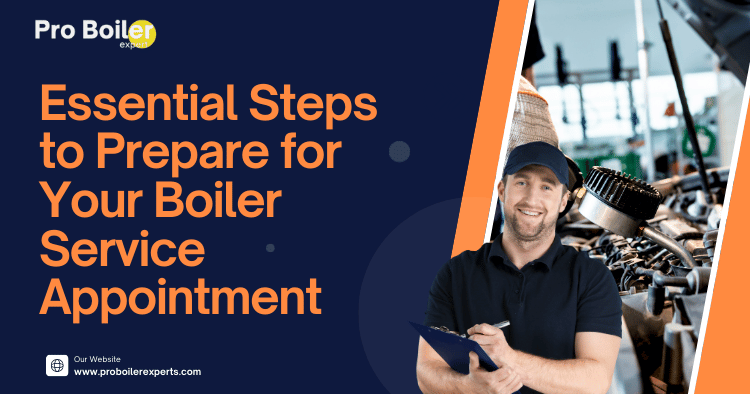Table of Contents
Step 1: Gather Necessary Information
Before your appointment, make sure to gather all relevant information about your boiler, including the model number, service history, and any previous issues you’ve encountered.
Step 2: Prepare Your Boiler Area
Ensure that the area around your boiler is clear of any obstructions. This will help the technician access the boiler easily and safely.
Step 3: Schedule the Appointment
Contact your service provider to schedule the appointment at a time that is convenient for you. Be sure to confirm any details and ask about the expected duration of the service.
Understanding the Importance of Boiler Servicing
Regular boiler servicing is crucial for the efficiency and longevity of your heating system. Just like your car, your boiler requires routine check-ups to function optimally. A well-maintained boiler not only operates more efficiently but also reduces the risk of breakdowns and potential safety hazards.
FAQs:
- Why is boiler servicing necessary?
Regular servicing ensures that your boiler operates safely and efficiently, reducing energy costs and the risk of carbon monoxide leaks. For more information on the benefits of regular servicing, check out the benefits of professional boiler maintenance services.- How often should I service my boiler?
It’s generally recommended to service your boiler annually. This helps maintain its efficiency and performance, especially in the colder months. For additional tips on when to replace your boiler, refer to When to Replace Your Boiler: Key Signs to Watch For.
Gather Necessary Documentation
Before your service appointment, it’s important to collect any relevant documents related to your boiler:
- Manufacturer’s manual: This contains useful information regarding safety measures and service intervals.
- Previous service records: Having a history of past services can help the engineer understand your boiler’s performance and any recurring issues.
- Warranty details: If your boiler is under warranty, you may need to present this information during the service.
By providing thorough documentation, you allow the engineer to assess your boiler more effectively, leading to a more efficient service.
Clear Access to the Boiler
To ensure your boiler service goes smoothly, you must provide clear and safe access to your boiler. Here are a few tips:
- Remove obstructions: Move any furniture, boxes, or other items that might block access to the boiler.
- Ensure safety: Check that the area around the boiler is safe and free from hazards. This includes ensuring there is adequate ventilation.
- Secure pets: If you have pets, it’s wise to keep them in another room during the service to ensure the engineer can work without distractions.
Visual Aid: Access Checklist
| Item | Action Needed |
|---|---|
| Furniture | Remove obstructions |
| Boxes | Clear the area |
| Pets | Secure in another room |
| Ventilation | Ensure adequate airflow |
Check for Issues Before the Appointment
Before the engineer arrives, take a moment to check for any visible issues with your boiler:
- Unusual noises: Listen for any banging, clanging, or gurgling sounds that could indicate a problem. Refer to our guide on common boiler noises and their meanings.
- Leaks: Look for any signs of leaks around the boiler and piping.
- Error codes: If your boiler has a digital display, note any error codes that may appear.
Documenting these issues can help the engineer diagnose problems more quickly and accurately.
Prepare Questions for the Engineer
Having questions ready for your engineer can help you gain valuable insights into your boiler’s performance and maintenance. Here are some examples:
- What are the most common issues you encounter with my type of boiler?
- How can I improve the efficiency of my heating system? For tips on energy efficiency, check out our article on top energy efficiency tips for boiler installation.
- Are there any upgrades or modifications you would recommend?
By asking the right questions, you can make the most of your appointment and ensure that you understand your boiler’s needs.
Understanding the Process
Knowing what to expect during your boiler service can ease any concerns you might have. Here’s a general outline of the process:
- Initial assessment: The engineer will start with a visual inspection of your boiler and surrounding area.
- Testing and diagnostics: They will run tests to check efficiency, emissions, and safety features.
- Maintenance tasks: Common tasks include cleaning components, checking pressure, and replacing filters if necessary.
- Final report: After the service, the engineer will provide you with a report detailing the work completed and any recommendations for future maintenance.
Knowing these steps can help you feel more prepared and informed throughout the process.
What to Expect After the Service
Once the service is complete, you should receive a report detailing the condition of your boiler. This report may include:
- Recommendations for further repairs or replacements
- Confirmation of safety checks
- Advice regarding future maintenance
It’s a good idea to keep this report on file, as it can be useful for future service appointments or if you decide to sell your home.
FAQs:
- What if my boiler needs repairs?
Your engineer will inform you of any necessary repairs and provide a quote for the work needed.- How can I maintain my boiler between services?
Regularly check pressure levels, bleed radiators, and monitor for unusual noises or leaks. For tips on maintaining your boiler, see our guide on essential boiler maintenance tips.
By following these essential steps to prepare for your boiler service appointment, you can ensure a smooth and efficient experience. Regular maintenance is key to keeping your home warm and safe, so take the time to prepare accordingly. For further reading on boiler maintenance and safety tips, visit The Energy Saving Trust.
Remember, a well-prepared homeowner is a happy homeowner, especially when it comes to those chilly winter nights!
Sure! Please provide the Markdown content you would like me to convert to HTML.





